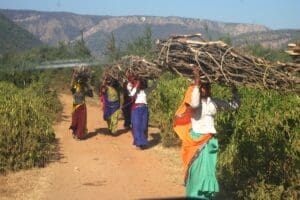With surging international, national, and sub-national policy attention to land tenure security (LTS) in developing countries in recent years, it is timely to ask: What have been the effects of thousands of efforts to improve it in dozens of developing countries? To date, almost all efforts to answer this question have been relatively small-scale, discrete studies within the boundaries of a single country.
Now, a meta-analysis (study of studies) published in Nature Sustainability titled “Influence of land tenure interventions on human well-being and environmental outcomes” has concluded that, on average, these effects tend to be beneficial. There is strong support for the finding that strengthening LTS is, on the whole, associated with positive human well-being outcomes – particularly through land formalization. There is also a positive association between strengthening of LTS and desirable environmental outcomes, but the finding is not as strong.
The meta-analysis synthesizes the findings of 117 quantitative studies, conducted from 1990 to 2018 in 42 countries. Approximately half the studies are of ‘high rigor’ in the sense of being randomized control trials, or involving the use of a difference-in-difference approach, counterfactuals, or control groups. Of the 117 studies, 92 look at human well-being outcomes, 48 at environmental outcomes, and 23 at both.
The authors acknowledge that the aggregation of studies, large as it is, may give disproportionate attention to some subjects and approaches at the expense of others. For example, there is strong attention to agriculture to the partial exclusion of nomadic, pastoralist, and indigenous populations. A strong focus on titling tends to obscure attention to devolution, information campaigns, conflict resolution, and strengthening the governance of customary institutions.
Tenure conditions and institutions vary enormously not only across but also within countries, but several countries account for a disproportionate share of the 117 studies. Among the possible reasons for this geographical skew are conjunctural and time-specific conditions that made certain countries the focus of research scrutiny, whereas other countries got less attention because of unfriendly institutions and challenging research environments.
Few studies have explicitly investigated the causal effects of LTS on Indigenous Peoples and local communities (IPLCs), as only four studies (three in South America and one in Indonesia) identified IPLCs as their study population. These studies evaluated the impacts of changes in land use planning and management, often in conjunction with land rights clarification and formalization. Part of the challenge in studying community-based tenure stems from its fluidity in tenure form (i.e., often becoming privatized) over time due to interventions.
Another challenge is that the definition of a “community” may also vary depending on whether it is seen from the lens of local people or the government, and if it’s based on local governance and cultural context. For example, studies from countries such as Ethiopia, China, and Vietnam often emphasized that land is owned by the State, or that collective and rural households have only usufruct rights to land for a certain amount of time. In these contexts, the bundle of rights of private ownership is more restricted, and community ownership is broader in scope and less autonomous in rule-making relative to lands under less-authoritative governance. IPLCs are increasingly recognized as critical stakeholders to advance sustainable development, climate change, and biodiversity goals, and it is critical that they are involved in development, implementation, and monitoring and evaluation of land policies that can directly affect their land, livelihoods, and overall well-being. In turn, these communities may be empowered and capture the benefits from these efforts.
The study concludes there is much that remains to be known about the effects of LTS. Given this and the high and growing importance of tenure on an increasingly crowded planet, the authors call for more research. An integrative approach, looking both at well-being and environmental outcomes, is a priority given the potential for rich insights and the dearth of such research to date. Shining a light on countries either insufficiently or not yet examined is also deemed important. Other priorities include conducting research over a longer period (inter alia to get better insights on environmental outcomes), having more studies with a ‘high rigor’ approach, and giving more attention to effects on biodiversity, and to the indirect impacts of LTS.
To read the article, click here.






